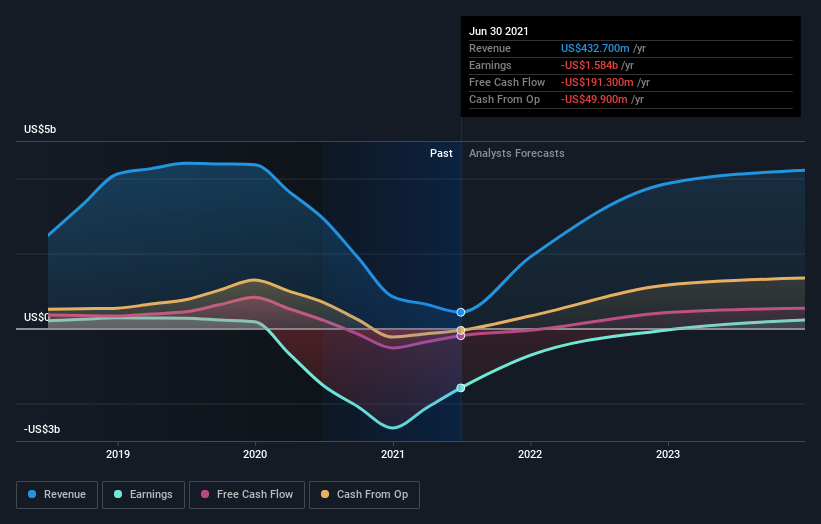Further weakness as Cineworld Group (LON:CINE) drops 13% this week, taking five-year losses to 71%
We're definitely into long term investing, but some companies are simply bad investments over any time frame. It hits us in the gut when we see fellow investors suffer a loss. Imagine if you held Cineworld Group plc (LON:CINE) for half a decade as the share price tanked 89%. And the share price decline continued over the last week, dropping some 13%. We really hope anyone holding through that price crash has a diversified portfolio. Even when you lose money, you don't have to lose the lesson.
Since Cineworld Group has shed US$122m from its value in the past 7 days, let's see if the longer term decline has been driven by the business' economics.
Check out our latest analysis for Cineworld Group
Given that Cineworld Group didn't make a profit in the last twelve months, we'll focus on revenue growth to form a quick view of its business development. When a company doesn't make profits, we'd generally expect to see good revenue growth. That's because it's hard to be confident a company will be sustainable if revenue growth is negligible, and it never makes a profit.
Over five years, Cineworld Group grew its revenue at 10% per year. That's a fairly respectable growth rate. So the stock price fall of 14% per year seems pretty steep. The truth is that the growth might be below expectations, and investors are probably worried about the continual losses.
You can see how earnings and revenue have changed over time in the image below (click on the chart to see the exact values).
Cineworld Group is well known by investors, and plenty of clever analysts have tried to predict the future profit levels. So it makes a lot of sense to check out what analysts think Cineworld Group will earn in the future (free analyst consensus estimates)
What about the Total Shareholder Return (TSR)?
Investors should note that there's a difference between Cineworld Group's total shareholder return (TSR) and its share price change, which we've covered above. The TSR attempts to capture the value of dividends (as if they were reinvested) as well as any spin-offs or discounted capital raisings offered to shareholders. Dividends have been really beneficial for Cineworld Group shareholders, and that cash payout explains why its total shareholder loss of 71%, over the last 5 years, isn't as bad as the share price return.
A Different Perspective
Cineworld Group shareholders are up 5.1% for the year. But that was short of the market average. But at least that's still a gain! Over five years the TSR has been a reduction of 11% per year, over five years. It could well be that the business is stabilizing. It's always interesting to track share price performance over the longer term. But to understand Cineworld Group better, we need to consider many other factors. Take risks, for example - Cineworld Group has 2 warning signs (and 1 which doesn't sit too well with us) we think you should know about.
We will like Cineworld Group better if we see some big insider buys. While we wait, check out this free list of growing companies with considerable, recent, insider buying.
Please note, the market returns quoted in this article reflect the market weighted average returns of stocks that currently trade on GB exchanges.
This article by Simply Wall St is general in nature. We provide commentary based on historical data and analyst forecasts only using an unbiased methodology and our articles are not intended to be financial advice. It does not constitute a recommendation to buy or sell any stock, and does not take account of your objectives, or your financial situation. We aim to bring you long-term focused analysis driven by fundamental data. Note that our analysis may not factor in the latest price-sensitive company announcements or qualitative material. Simply Wall St has no position in any stocks mentioned.
Have feedback on this article? Concerned about the content? Get in touch with us directly. Alternatively, email editorial-team (at) simplywallst.com.

 Yahoo Finance
Yahoo Finance 
